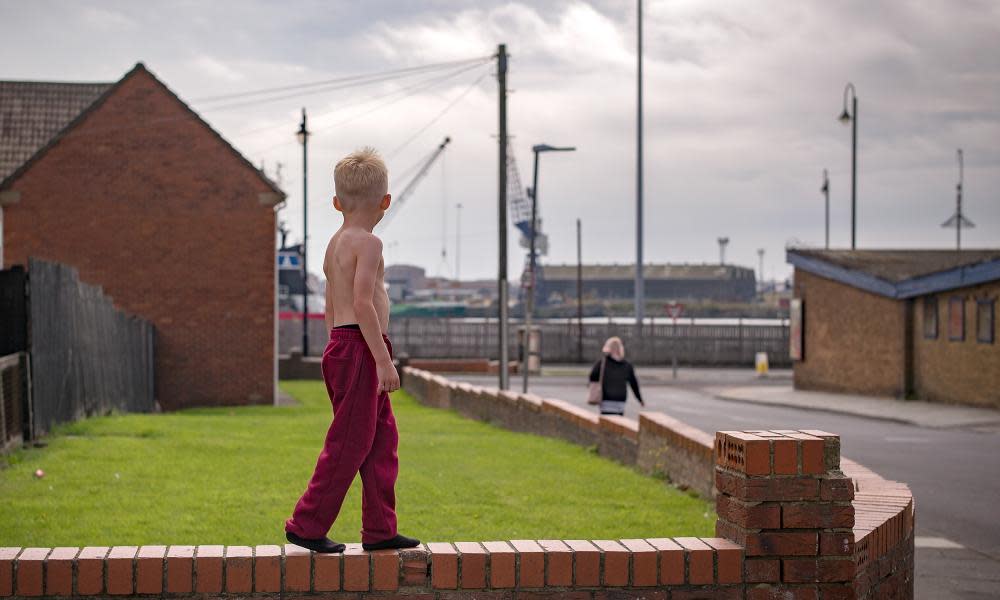British children living in poverty 'could hit record high' – report

The proportion of children in Britain living in poverty risks hitting a record high in the next few years as incomes stagnate and benefit cuts continue to bite, a report has warned.
A study by the Resolution Foundation thinktank said UK households had experienced flatlining living standards due to a lack of economic and pay growth in the past two years. Average incomes will not rise materially over the next two years either, it said.
The bleak forecast will hit lower-income families harder, according to the report, and child poverty could exceed previous highs reached in the early 1990s. Deprived families will bare the brunt of weak pay and benefit cuts, the report said.
While weak productivity and pay freezes were holding back living standards for most people, government policy was also hitting more deprived groups. The report noted the final year of the benefit freeze, which will reduce working-age household incomes by £1.5bn, will start in April, while the impact of the two-child limit on benefits will grow over the remainder of this parliament.
This is having a direct impact on child poverty, said the report, which has been increasing continuously since 2011. It predicts that by 2023-24 the proportion of children living in relative poverty (after housing costs) is on course to hit 37% – exceeding the previous record high of 34% in the early 1990s. This could mean an extra 1 million children living in poverty in the next five years, it said.
Adam Corlett, senior economic analyst at the Resolution Foundation, said: “UK households have already taken a £1,500-a-year hit to their incomes. There’s now a huge risk that their incomes stagnate over the next few years as the economy’s pay performance struggles to get out of first gear.”
“The outlook for low and middle-income families is particularly tough,” said Corlett, citing welfare cuts as a major factor.
He added: “The UK’s current economic outlook is highly uncertain, and will hopefully surprise on the upside. But whatever direction the economy takes, the government must reassess the continuation of working-age welfare cuts. Otherwise, its non-Brexit record risks being stained by a return to record levels of child poverty.”
Louisa McGeehan, the Child Poverty Action Group charity’s director of policy, said the report was a wake-up call. “After years of deep social security cuts we are on the cusp of a child poverty crisis which will damage both the life chances of a generation and the wider economy.
“In the UK we have been very successful at reducing poverty among pensioners but we have allowed child poverty to rise. That is unjustifiable in a country that is compassionate and believes that every child matters,” she said.
The report, The Living Standards Outlook 2019, combines data, the Office of Budgetary Responsibility’s economic projections and the impact of current government policy to reach its findings.
The report warns that by the end of parliament the majority of children in single-parent families or in larger families, with more than two children, could be living in relative poverty.
“The good news is that child poverty is responsive to policy change – this means that if we act fast we can take action to reduce it … The government should also end the punitive, poverty-producing two child limit and benefit cap that break the link between children’s needs and they support they get. It’s only by reinvesting in struggling families that the government can avoid presiding over record levels of child poverty,” said McGeehan.
The Resolution Foundation says increasing wage growth by 1% (bringing it into line with the pre-crisis average of 4%) could treble the strength of income growth over the reminder of parliament.
It also finds that were the UK to repeat the employment success of the last two years for the next two, bringing an extra 900,000 people into work, typical income growth over the next five years would increase to 2.6%.
The foundation said while strengthening pay and employment was not directly within the government’s short-term control, action to prevent child poverty hitting a record high should be a priority.
A government spokesman said: “Our priority is to support people to improve their lives. Since 2010 we’ve introduced the National Living Wage, doubled free childcare for three and four-year-olds, and cut taxes for 32 million people to help families meet the everyday cost of living and keep more of what they earn.
“But we know that some people need more support. That’s why we’re spending £90bn to support families who need it, and by 2022 we will be spending £28bn more on welfare than we do now.”

 Yahoo News
Yahoo News 
